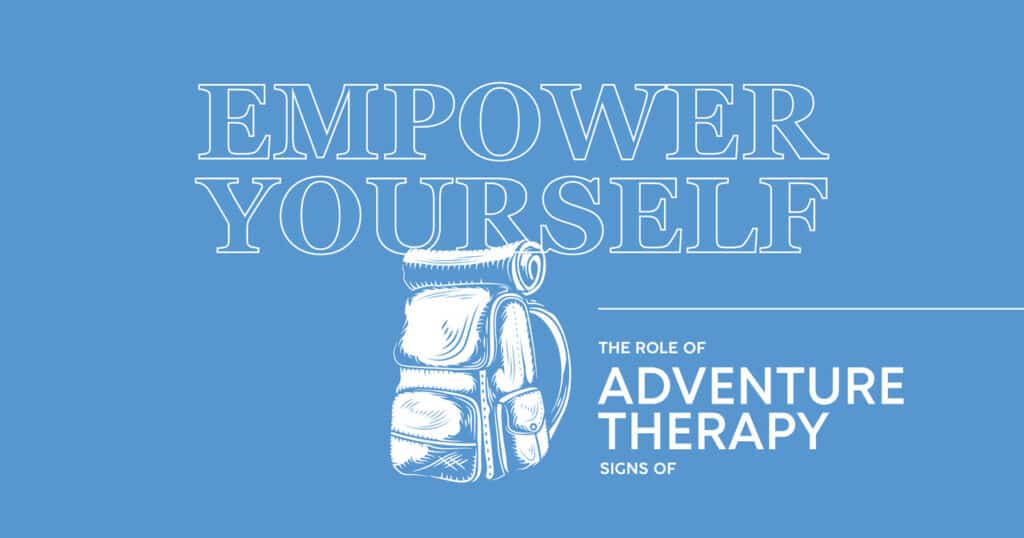Unleash Your Full Potential with Adventure Therapy
Feeling stuck in a routine and unable to break free? Imagine escaping and rejuvenating your mind and spirit. Enter adventure therapy – a unique therapeutic approach that combines physical activities, nature, and professional guidance to empower individuals and improve their overall well-being. In this guide, we’ll explore the transformative power of adventure therapy programs and their essential role in promoting both mental health and physical health.
What is Adventure Therapy?
Embarking on adventure therapy can be an incredibly transformative experience! This therapeutic approach incorporates exhilarating outdoor activities to foster psychological healing and personal growth. From thrilling adventure experiences like rock climbing to peaceful camping, individuals confronting physical, emotional, and mental health challenges can find solace and growth through this method. It’s an exciting and powerful way to overcome obstacles and thrive! Adventure therapists often integrate various adventure activities to enhance the therapeutic experience. The adventure therapy setting is diverse, ranging from wilderness therapy programs to specialized outdoor locations designed for maximum impact.
Unlocking the Power of Adventure Therapy
Physical Health Improvements
Engaging in outdoor adventure experiences offers significant physical health benefits, such as improved cardiovascular fitness, muscle strength, and coordination. These physical activities are essential components of adventure therapy programs, which often involve activities like hiking, mountain biking, and snow camping. The health of youth participants is greatly enhanced by these physical challenges, which promote not only technical skills but also emotional resilience.
Mental Health Enhancements
Adventure therapy has been shown to alleviate symptoms of anxiety, depression, and PTSD. By integrating physical activities, exposure to nature, and therapeutic approaches, it can greatly improve mental health treatment outcomes. Mental health professionals recognize the power of adventure-based therapy in promoting a growth mindset and fostering healthy relationships. This method is particularly effective for individuals dealing with affective disorders, chronic stress, and other mental health issues.
Building Resilience and Overcoming Challenges
Adventure therapy helps individuals build resilience by overcoming physical challenges, which, in turn, helps them handle life’s difficulties more effectively. The outdoor setting, an essential component of this therapeutic approach, plays a crucial role in facilitating personal growth. Engaging in wilderness therapy and experiential therapy programs enables participants to develop interpersonal skills and enhances their ability to communicate and collaborate toward a common goal.
Boosting Self-Esteem and Promoting Positive Behaviors
Completing challenging activities enhances self-esteem and self-efficacy, leading to newfound confidence. These adventure experiences help develop a healthy identity and empower individuals in their personal lives. Adventure therapy is particularly effective in promoting positive behaviors by encouraging the development of interpersonal relationships and social skills.
How Adventure Therapy Works
Therapeutic Activities
Adventure therapy activities are designed to be both challenging and therapeutic. Common activities include:
- Hiking: Promotes physical health and provides a tranquil setting for reflection.
- Rock Climbing: Enhances problem-solving skills and builds trust through belaying.
- Rafting: Encourages healthy communication, teamwork, and stress management.
- Camping: Fosters a sense of community and self-reliance.
- Mountain Biking: Develops coordination and physical endurance, essential for both mental and physical health.
- Snow Camping: Builds survival skills and resilience in challenging environments.
The Role of Nature
Nature plays a significant role in adventure therapy. Studies show that spending time in natural settings can reduce stress, lower blood pressure, and enhance mood. Contact with nature serves as a calming backdrop, allowing individuals to focus on their therapy without distractions. These outdoor experiences contribute to the positive effects of adventure therapy, promoting emotional balance and resilience.
Combining Therapy with Adventure
Adventure therapy merges outdoor activities, physical challenges, and traditional therapeutic practices. This clinical approach ensures that individuals confront their fears while receiving the necessary support to process their experiences. This model often includes ropes courses and wilderness therapy, designed to foster personal growth and resilience.
Who Can Benefit from Adventure Therapy?
Individuals with Anxiety and Depression
Adventure therapy is particularly beneficial for individuals struggling with mental health issues like anxiety and depression. The physical activities involved, combined with therapeutic interventions, make it an effective treatment option. It’s also beneficial for those dealing with substance use disorders and chronic stress disorders.
At-Risk Youth
Adventure therapy programs for at-risk youth focus on building self-esteem, improving social development, and providing a sense of accomplishment. Programs like Chicago Adventure Therapy offer exemplary adventure therapy services that foster healthy relationships through family therapy sessions and relationship therapy.
Adventure Therapy vs. Traditional Therapy
Hands-On Experience
Unlike traditional therapy, which often takes place in a clinical setting, adventure therapy offers an experiential, hands-on approach. This method can be more engaging for those who struggle with conventional therapy. Adventure therapists utilize experiential therapy to provide immediate feedback and foster personal growth.
Group Dynamics
Adventure therapy often involves group dynamics, where participants work together to achieve a common goal. This aspect is crucial in promoting healthy communication, conflict resolution, and the development of interpersonal relationships.
How to Get Started with Adventure Therapy
Finding a Qualified Therapist
When exploring adventure therapy, it’s essential to find a therapist with the proper credentials. Look for professionals who hold an adventure therapy certification or degree and have experience in mental health treatment and outdoor therapy settings.
Preparing for the Journey
Adventure therapy requires physical and mental preparation. Outdoor adventure experiences like mountain biking and snow camping may require specific gear and preparation. Building resilience and responsibility are key elements in the journey.
FAQs
Q: What is the primary goal of adventure therapy?
A: The main goal of adventure therapy is to use physical activities and nature to promote mental health and personal growth.
Q: Is adventure therapy suitable for everyone?
A: While adventure therapy can benefit many people, it may not be suitable for individuals with certain physical limitations or severe mental health conditions. It is essential to consult a qualified therapist to determine if it’s right for you.
Q: How long does an adventure therapy program last?
A: The duration of adventure therapy programs can vary. Some are short-term, lasting a few weeks, while others may extend over several months.
Q: Can adventure therapy be combined with other forms of treatment?
A: Yes, adventure therapy is often used in conjunction with traditional therapy methods, such as cognitive-behavioral therapy (CBT) or medication, to provide a proper treatment plan.
Conclusion
Adventure therapy is a compelling approach to mental well-being, intertwining physical challenges, nature immersion, and therapeutic support. Whether you’re grappling with anxiety, depression, PTSD, or seeking a fresh avenue for personal empowerment, adventure therapy could be the catalyst for a healthier, more rewarding life. It’s crucial to recognize that the path to mental wellness is unique to each individual, and embracing adventure therapy as a starting point may be the most empowering choice you make.
Take Charge of Your Mental Health
If you or a loved one is considering adventure therapy, seek professional guidance to ensure the best possible outcome. With tailored individualized treatment plans, the proper support, and commitment to the process, adventure therapy can be a life-changing experience for those seeking growth and healing.




